'With enjoyable physical activity, stress release quality sleep and the right diet, we can reverse the metabolic damage which is wreaking havoc in the world and especially in India.'
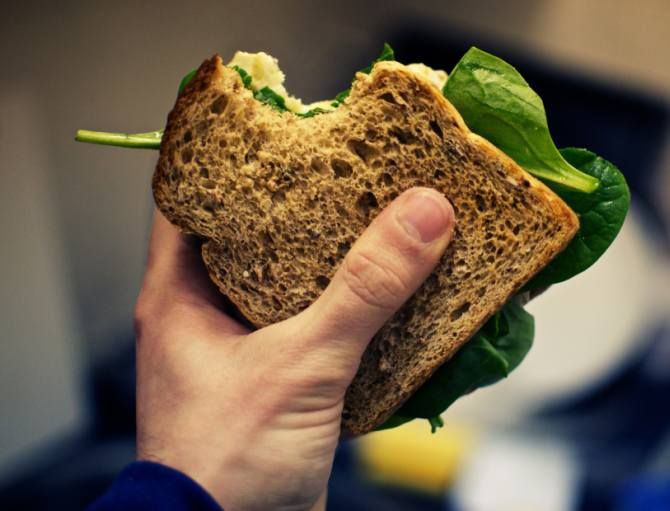
"It may be that we can't control our children 100 per cent of the time. They go to a party. They're going to get some junk food, this or that."
"But if we say no and keep that junk food and unprocessed and unhealthful influences out of the house, then whenever the child is at home, there will only be influences in the right direction," Dr David Ludwig tells Rediff.com's Vaihayasi Pande Daniel in the second part of a fascinating interview.
- Part 1 of the interview: Why you feel hungry all the time
What about peanut and olive oil? Bran oil? Are they good for us?
That was Step 1, I told you about (increase the fats overall).
Lower the carbohydrates by increasing the fats -- olive oil, nuts, avocados, nut butters, full dairy, rich sauces and spreads.
Would peanut oil too come in that category because many Indians cook in that oil?
Peanut oil is okay.
You want to make sure to avoid anything with trans fats or partially hydrogenated. This is critical because we know, definitively, that these trans fats are really poisonous.
They are an industrial product that doesn't exist in that form in nature. And they wreak havoc with our metabolism.
So let's be sure that if we are eating vegetables oil, it hasn't been hydrogenated.
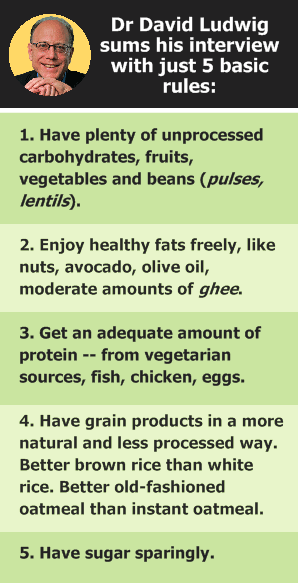 Is there any gradation in the way one should consume non-hydrogenated vegetable oils?
Is there any gradation in the way one should consume non-hydrogenated vegetable oils?
Which are better? Which are worse? Or are they all the same?
Generally speaking, I recommend we start with lots of mono-unsaturated fat.
There are three kinds of fat -- saturated, mono-unsaturated and poly-unsaturated.
We want lots of mono-unsaturated. We get those from nuts, olive oil, avocado.
We want poly-unsaturated too. That can come from plant oils, like safflower and sunflower.
Then it is fine to have moderate amounts of saturated fats. That can come from butter, ghee and coconut oil. It is fine to have all of those.
You just want to avoid the hydrogenated oils. It is generally best to emphasise the mono-unsaturated.
Basically we want to get some poly-unsaturated and some saturated fat too.
Is there any restriction on the quantity of milk one can have or should have?
There's no minimum requirement for milk.
You don't have to drink milk to get healthy nutrition.
If you are going to have dairy products, make them full fat.
There is no reason to be eating fat-free dairy. Full fat is actually healthier and it is tastier.
You are attached to the Obesity Prevention Centre at the Boston Children's Hospital as its director.
Childhood obesity is a big issue again among the middle classes and upper classes in India and among those who follow an Indian diet.
In India, we are posed at a stage where foods that are now being rejected are becoming more popular, whether it is cornflakes or instant noodles.
When you see your patients, either the children or the children's parents, what advice do you give on protecting children from sugars, chips and Coke? Especially when advertisements are being thrown at children that makes all this stuff attractive.
How do you advise the parents and children that you meet?
We use the same two techniques that parents have used throughout history.
I call them: Protecting the home environment and modeling.
First off, protecting the home environment means the stuff that doesn't come into the house.
We create the home as a bastion of protection or health.
It may be that we can't control our children 100 per cent of the time. They go to a party. They're going to get some junk food, this or that.
But if we say no and keep that junk food and unprocessed and unhealthful influences out of the house, then whenever the child is at home, there will only be influences in the right direction.
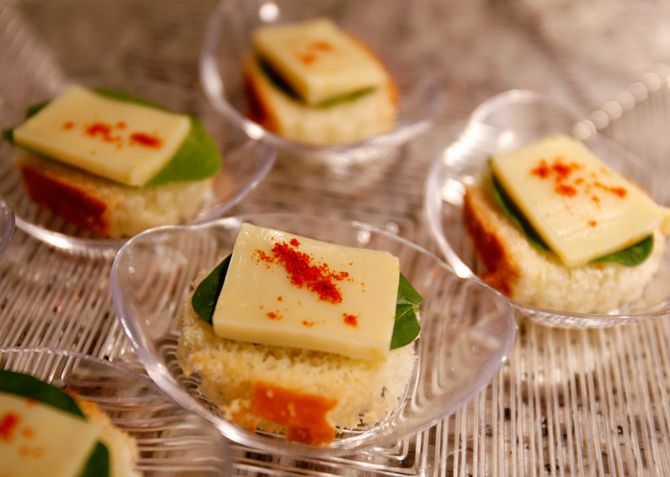
Photograph: Shannon Stapleton/Reuters
If the child is hungry, s/he's going to find fruits and vegetables, nuts, cheese and various other kinds of whole foods.
There is just not going be any reachable, findable sugary cereal. There's nothing to fight about. Once you bring those things in the home, then you set yourself up for failure.
It's like letting the enemies into the inner sanctum.
Number two is modeling. If this is going to work, the parents have to do it. They have to 'walk the walk'. They can't just 'talk the talk'.
If your children see that you are eating a natural, healthful diet, not sitting in front of the TV too much and are getting outdoors as a family, that's going to influence your child automatically.
You don't have to punish them. You don't have to force them to do anything.
These two techniques -- protecting the home environment and modelling -- create like a bubble of protection around the child, which may take a while to have full effect.
But that effect is going to become internalised. And stay with the child for the rest of his/her life, which is the most successful outcome of parenting.
The child incorporates it into his own ethics, values and judgement, healthful and responsible behaviour.
America, and most of the world, India too, went through a whole era of not understanding how bad processed carbohydrates are.
But hasn't an equal contributor to childhood obesity been the gadget life, in front of the television life and on the phone life? Or not really?
Yes, that's part of protecting the home environment.
It is not just for food. Also for activities: (Don't) encourage too much sedentary time. And conversely encourage physical activity.
We don't want to have high-definition flat screen televisions in every room of the house.
We certainly don't want it in the bedroom or dining room.
We want to be focused on mindful eating and relaxing conversation, not distracted by the TV during meals. So consider getting rid of most of the TVs. Or get rid of all the TVs.
Children do not require television time for healthy development.
Simultaneously do this to the home (encourage physical activity) as best you can.
It going to be different for someone living in a crowded city, versus a suburb or a rural area. But you can build in opportunities for physical activity.
If you have a daughter maybe just a music system in her bedroom -- turn that on, close the door and dance.
Or if you have got a little space around the home or a place to get outdoors, throw the ball play and play other games.

Photograph: Jianan Yu/Reuters
If you are in a crowded city, the whole family can go out -- in my book Always Hungry -- we recommend what is called a passegiata. That's an Italian concept.
The whole family after dinner goes out for a walk. It stimulates metabolism. It lowers stress. And provides an opportunity for family bonding, interaction with your neighbours.
It is not about getting on the treadmill 20 minutes a day.
It is building enjoyable physical activities into one's lifestyle.
That's another thing that is happening in many places like in India. Children are wanting to go to gyms, to build abs and get on treadmills. That's to be discouraged entirely?
No, nothing wrong with that. But we don't have to set that up as the ideal. Or as the only means for success.
We have talked all about the diet. I gave you three steps. We couple diet with three lifestyle supports. We talked about (the first) enjoyable physical activity.
There are two others, that are related to the underlying problem of insulin resistance and chronic inflammation.
The second is stress release. Life is stressful when we don't manage our stress well.
The hormone cortisol is a stress hormone. It goes up. It programmes fat cells to grow. We need ways to de-stress ourselves and my book has (relaxation) programmes for that.
The third key life support is quality sleep. Too many people are either sleep deprived or if they are getting enough hours, but they are not getting the right quality.
We talk about creating bedroom as a sleep sanctuary.
Turn off the electronics early in the evening. Develop a practice that helps the body unwind and prepare for sleep.
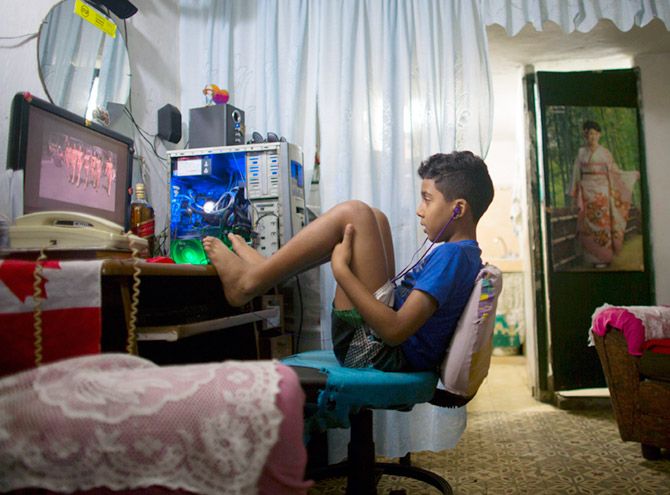
Photograph: Alexandre Meneghini/Reuters
You can't just be on stimulating electronics, watching the horrible things in the news up to 10 pm and then hope that when you turn off the light you are going to get good quality sleep.
With these three things and the right diet, we can reverse the metabolic damage which is wreaking havoc in the world and especially in India.
What about this whole thing about not having that heavier dinner and lighter lunch? Maybe there is no such thing.
Shouldn't meals be equal sized and not large?
How many hours before sleeping should one eat?
If one feels like binging in the middle of the night what should one binge on?
In our approach, we recommend three meals and actually two snacks a day.
We want people to eat enough so they no longer are hungry. We are trying to turn off the starvation response.
The underlying problem, when these fat cells are over stimulated, is the body goes into starvation.
The fat cells stay, the rest of the body starves, we make stress hormones, hunger goes up, the metabolism slows down.
We want to turn that off with the right foods, eaten frequently.
So we start off with three meals and two snacks a day -- that's part of the meal plan.
We tell people let their hunger be the guide.
When you are eating properly, your body will tell you when it (requires) food and when it has had enough. Those are ancient encoded regulatory systems in the body.
Over time the body shifts into weight loss.
As you are losing weight, your hunger is naturally going to be lower. Because you are burning your stored fat, so you don't need as much food.
Then, when you approach a lower, hopefully ideal body weight for you, hunger naturally increases.
You need to focus on the quality of what you are eating.
Give yourself regular meals. Your hunger will do the rest. It will be your guide.
That's totally opposite to the calorie-restricted diet where we ignore the body and try to force a restriction on it.
Then, of course, the body fights back.
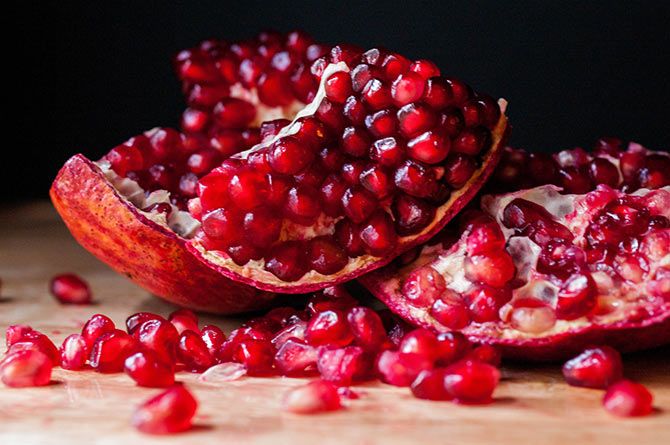
So three meals a day. Breakfast, lunch and dinner. If we are having an evening snack, we want that to be light.
You don't want to go to bed with too much food in your stomach.
But we don't make absolute stipulations about when your last meal should be.
If you are hungry and it is not a meal time, we encourage snacking, but nicely.
On a fruit or?
In the beginning of the meal plan, our snacks are much higher in fat.
We would do something like: If the snack is going to be fruit, we would combine that with nuts or chick peas or some other foods with proteins and fat so we get a good balance.
Then, over time, as your metabolism improves, you get a little more flexibility to just have a piece of fruit.
Or you may find that you don't (want) those extra snacks.
One of the treats we recommend actually as a health food is real, dark chocolate.
This has got to be a minimum of 70 per cent chocolate. The higher the chocolate content, the lower the sugar.
Dark chocolate works great in the studies of weight control, heart disease prevention.
Dark chocolate rather than milk chocolate -- Indians eat a lot of milk chocolate.
Dark chocolate, which you should be able to get, is much more satisfying. It has a stronger flavour.
You don't need as much. An ounce of dark chocolate and a handful of roasted nuts.
Indian society is fairly social. So there are lots of festivals, lots of holidays. These days everybody celebrates Christmas, New Year. There are weddings.
So when you are in those kind of circumstances and you want eat, what is the best thing you should cheat on? An ice cream or something high in carbs?
We tend to think of treats just as sugary things. But high-fat foods can be very satisfying.
When you are eating them, you inherently don't crave the sugar as much.
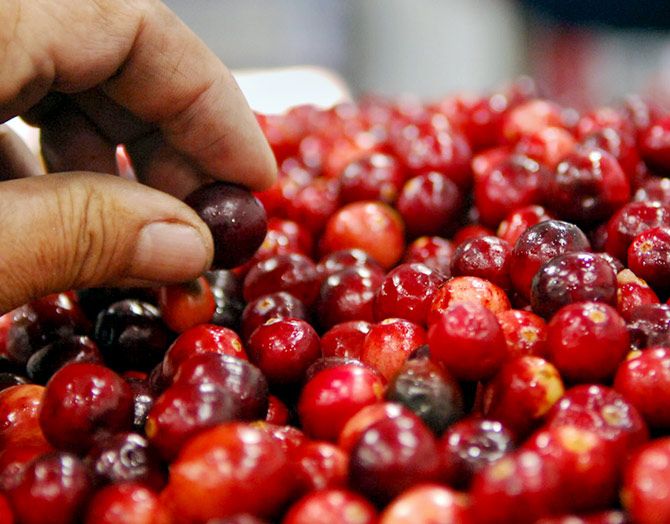
Photograph: Mathieu Belanger/Reuters
So like some paneer?
Paneer would be a good savoury snack. If you want a sweet snack, chocolate and berries.
The one fruit not to overdo is banana, because that's a little starchier to digest.
You want to have the other fruits, berries are the best. Apples, pears, peaches...
About berries: Is there any differentiation when it comes to fruit on whether you are having it dried or fresh?
We don't get that much berries.
Should one, for instance, have a dried cranberries? Or is that higher in sugar?
With dried cranberries, it's going to have added sugar to it (too).
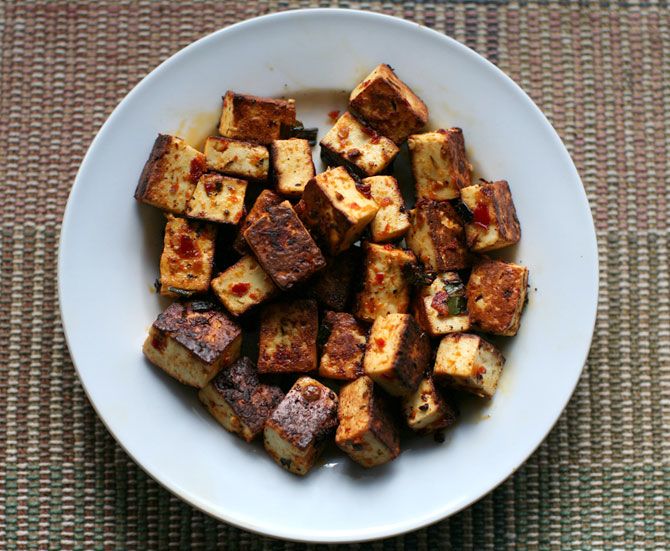
Photograph: Kind Courtesy Christopher Paquette/Creative Commons
Dried fruit is not as good as fresh fruit.
Are there any more no go areas among fruits?
The tropical fruits tend to be not quite as good. Like banana, mango, papaya. Those are still okay.
But the best ones are the temperate fruits, like apple, peach, pears, berries.
How good is honey for us?
All the sweeteners, we want to use sparingly. It doesn't mean never. But we don't want to be having sweet things three times a day.
If you are going to have a sweet dessert, make sure it comes after a balanced meal, where you had proteins, vegetables, fat.
Then if you have a sweet dessert afterwards, it will be balanced.
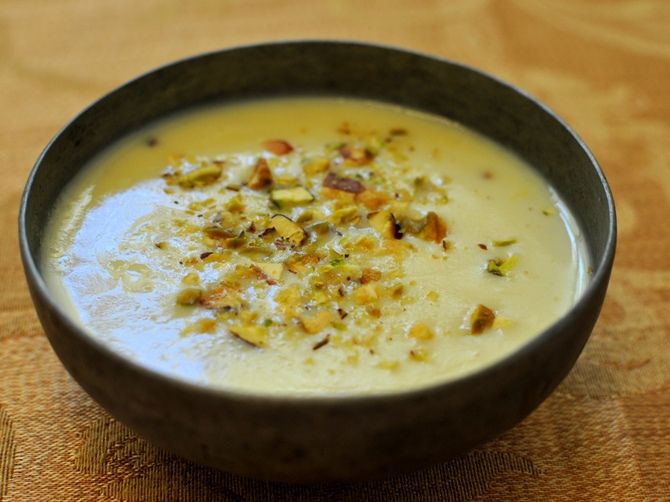
A dessert should always be eaten after a balanced meal.
Photograph: Kind Courtesy Jasleen Kaur/Creative Commons
Your body will be able to balance it. You don't want to have the sweet thing on an empty stomach, just by itself.
Since you are familiar with Indian food you would know that dosas, which are made from pulses, are good right?
Yes.
That is if you reduce the rice content and make them more pulse based?
That's exactly it.
That was number two in the things we were listing in the beginning of our conversation, where you shift from more processed carbohydrates to more natural carbohydrates.
You all (Indians) like dals. Dals are going to be wonderful. Any kind of bean dish or pulse dish.
You just eat less white rice, more beans and pulses. Maybe add some paneer. Maybe add some tofu. Add some fish, if you are not a vegetarian. Then some fruit. And chocolate for dessert. Wonderful!
For more information about Dr David Ludwig's three-phase programme, his diet plan, recipes and food philosophy, you can check his Web site: drdavidludwig.com









